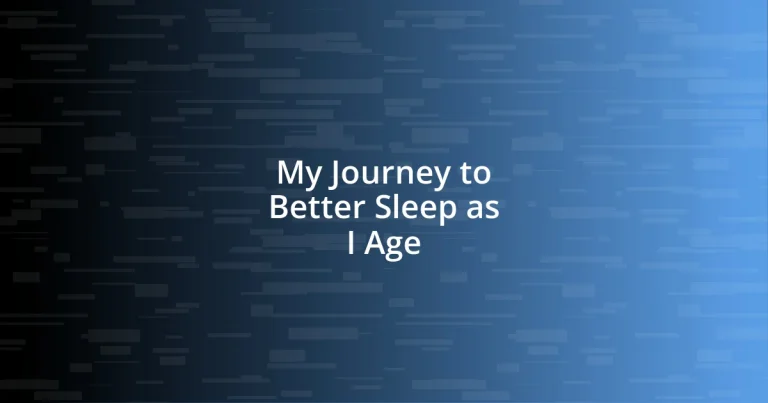Key takeaways:
- Aging leads to changes in sleep patterns, including reduced deep sleep, increased awakenings, and heightened sensitivity to light and temperature.
- Establishing healthy sleep habits, such as a consistent bedtime routine and a sleep-friendly environment, significantly improves sleep quality.
- Consulting sleep professionals can provide personalized insights and strategies to address sleep issues, enhancing overall sleep health.
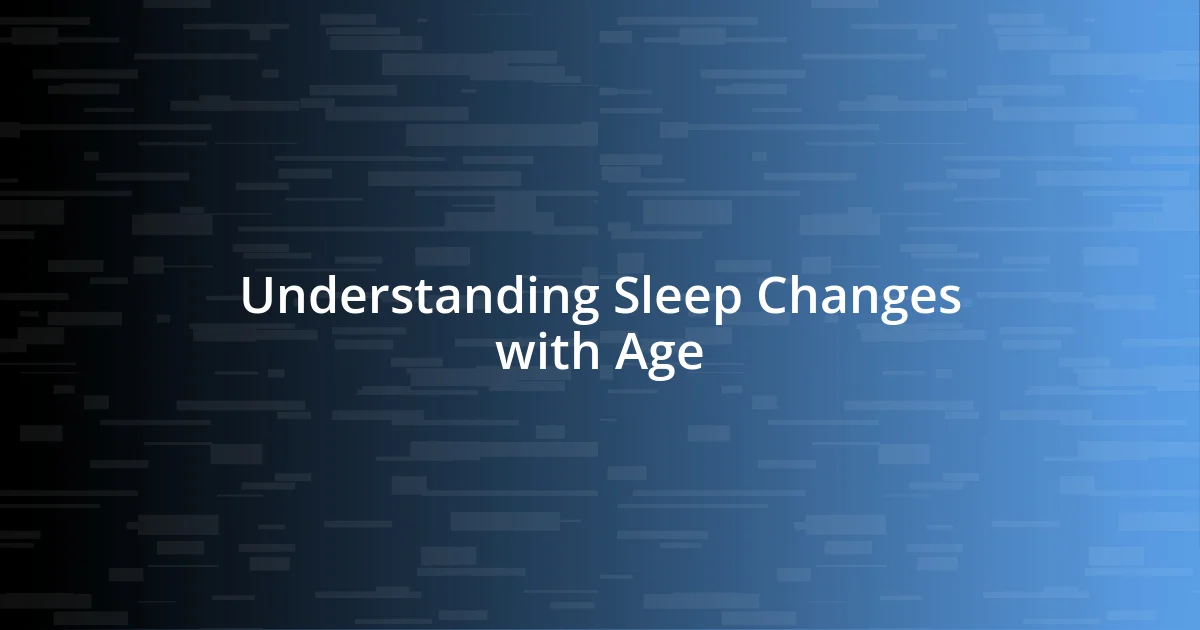
Understanding Sleep Changes with Age
As we age, our sleep patterns often shift in both duration and quality. I remember the days when I could sleep through anything, but now, it feels like every little sound wakes me. Isn’t it frustrating to wake up more tired than when you went to bed?
The amount of time spent in deep sleep tends to decrease, making it harder to reach that restful state. I’ve found that I wake up more frequently during the night—sometimes even feeling wide awake at odd hours. It’s a peculiar feeling, like I’m in a constant state of half-sleep. Have you noticed this change, too?
Moreover, age can bring about a greater sensitivity to fluctuations in light and temperature. I’ve started using blackout curtains and adjusting my thermostat at night. It’s interesting how our bodies demand these little adjustments as we grow older, don’t you think?
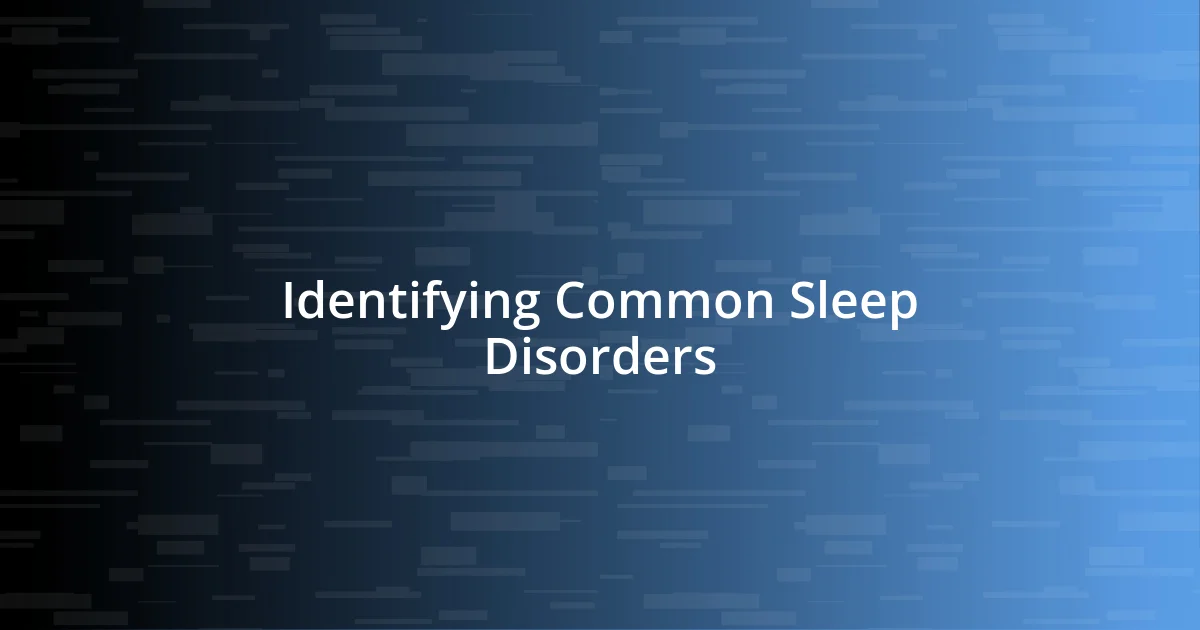
Identifying Common Sleep Disorders
Identifying common sleep disorders is crucial for understanding why our sleep patterns change as we age. For instance, I’ve personally battled insomnia during particularly stressful times; it’s like a thief stealing precious hours of rest right when I need it most. This constant tossing and turning really made me appreciate the value of good sleep even more.
Some of the most prevalent sleep disorders include:
- Insomnia: Difficulty falling or staying asleep.
- Sleep Apnea: Interruption of breathing during sleep, often accompanied by loud snoring.
- Restless Legs Syndrome: An overwhelming urge to move the legs, leading to discomfort.
- Narcolepsy: Excessive daytime sleepiness and sudden sleep attacks.
- Circadian Rhythm Disorders: Misalignment between a person’s internal clock and their sleep schedule.
Recognizing these disorders isn’t just about acknowledging discomfort; it can be the first step toward reclaiming restful nights. I’ve found that knowing what to look for helps me identify my own patterns and take action before they spiral into a bigger issue.
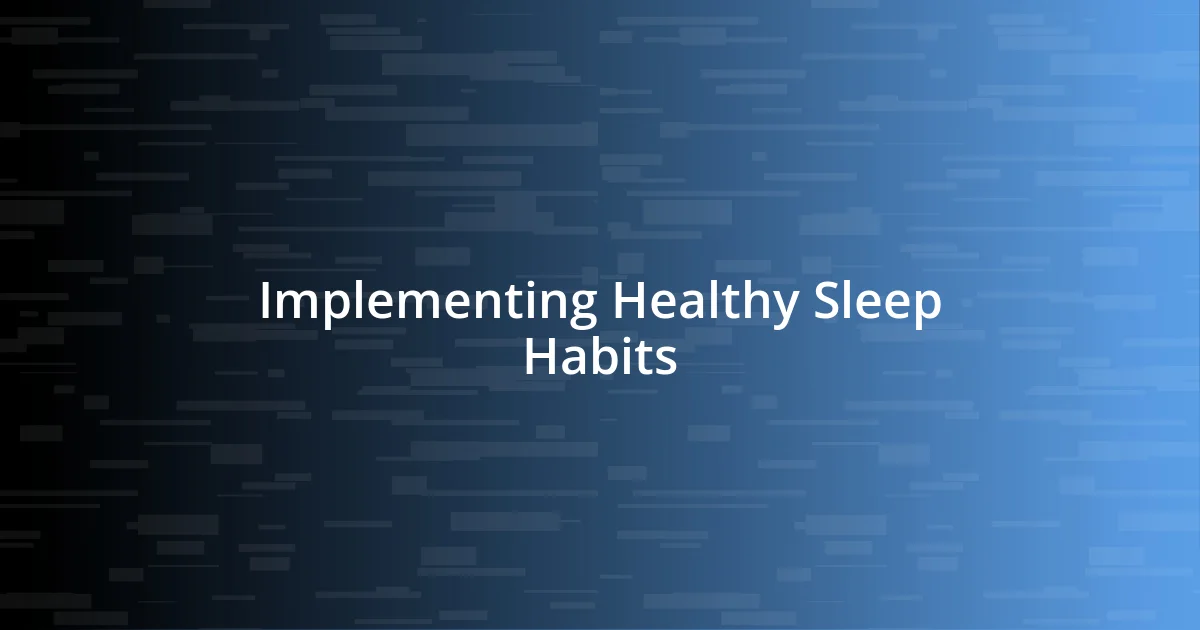
Implementing Healthy Sleep Habits
Implementing healthy sleep habits has truly been a game changer for me as I navigate my sleep challenges. One key habit I’ve adopted is a consistent bedtime routine. I remember the nights when I’d just fall into bed after a long day, only to lie awake, my mind racing. Now, I take about 30 minutes to unwind with a book and a cup of herbal tea. This small ritual has helped signal to my body that it’s time to relax, making falling asleep a little easier.
Another aspect I find essential is creating a sleep-friendly environment. I used to dismiss the idea that my surroundings could impact my sleep quality, but I stand corrected! By minimizing noise with a white noise machine and using soft, comfortable bedding, I noticed a dramatic difference. It’s almost like wrapping myself in a cozy cocoon. Have you considered how much your sleep space influences your rest? For me, these changes were worth it.
Lastly, I’ve learned the importance of watching my diet, especially in the hours leading up to bedtime. I used to indulge in late-night snacks and caffeine, thinking it wouldn’t affect me. However, I found that cutting back on those indulgences has not only improved my sleep but has also made my mornings feel fresher. Little adjustments really do add up, don’t they?
| Healthy Sleep Habit | Description |
|---|---|
| Consistent Bedtime Routine | Establishing a nightly ritual to signal relaxation before sleep. |
| Sleep-Friendly Environment | Creating a comfortable space by reducing noise and ensuring proper lighting. |
| Dietary Considerations | Avoiding heavy meals and caffeine before bedtime for better sleep quality. |
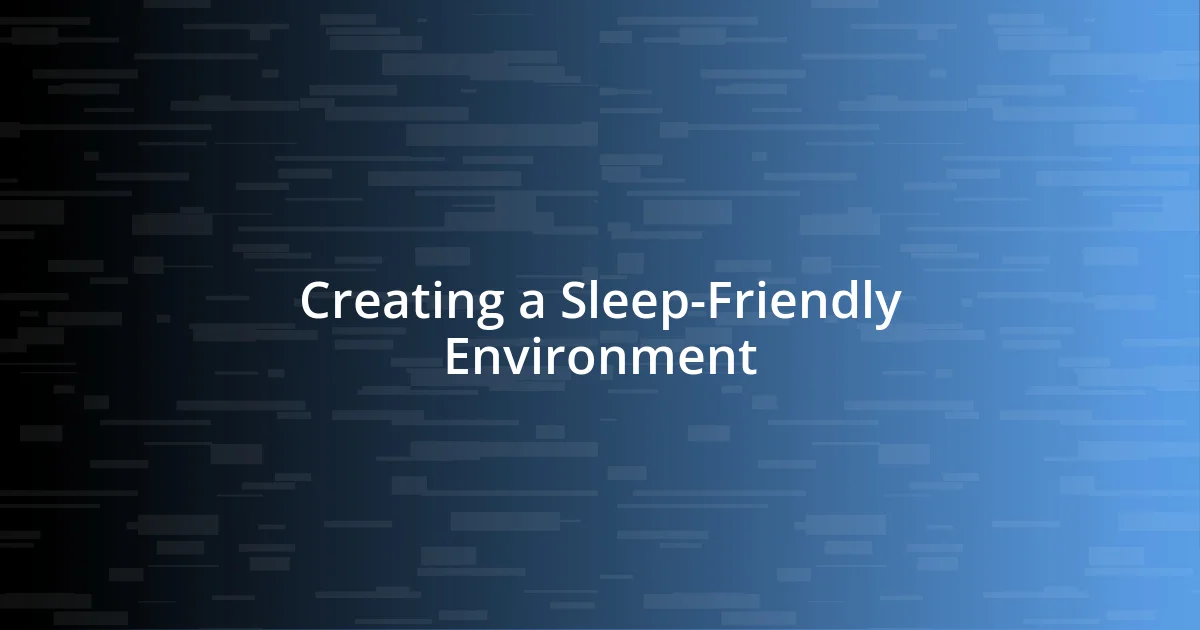
Creating a Sleep-Friendly Environment
Creating a serene sleep environment often starts with simple adjustments. I once had a corner of my bedroom that I called “the clutter corner” — papers, clothes, and random items piled up. It wasn’t until I cleared that space that I realized how much of a distraction it had been. Now, with just a few cherished items and a fresh coat of calming paint, I feel a world of difference every time I step into my sanctuary.
Lighting plays a critical role in winding down as the day fades. I used to keep bright lights on until I was ready to sleep, without realizing how that affected my melatonin levels. Switching to soft, warm lighting in the evening and using blackout curtains truly transformed my space into a cozy oasis, one that beckons for relaxation. Have you tried dimming the lights to prepare your mind for rest? It’s incredible how much a small change can signal your body that it’s time to shut down.
Lastly, temperature can significantly influence sleep quality. I used to think I could sleep through anything, but I’ve since learned that a cooler room helps me drift off more easily. I recommend setting your thermostat to around 65°F, which has worked wonders for me. It’s fascinating to me how such nuances can alter the quality of your sleep. What’s your sleep environment like? Perhaps a little fine-tuning might lead you to a more restorative night.

Exploring Natural Sleep Aids
Exploring natural sleep aids has opened up a fascinating world for me. I stumbled upon valerian root quite by accident while browsing for herbal remedies. I was skeptical at first, but after just a week of taking it before bed, I felt a noticeable difference. My rest became deeper, and I woke up feeling less groggy. Have you ever wondered how a simple herb can have such an impact?
Another sleep aid I’ve enjoyed is melatonin, especially on those nights when my mind refuses to stop racing. I remember one particularly restless night when I decided to give it a try. The thought of getting up early the next day made me anxious, but I found that a small dose helped quiet my thoughts. It’s amazing how just a tiny pill can get your body back on track. Have you ever experienced a similar moment of desperation for a good night’s sleep?
I also began incorporating magnesium supplements into my routine, which I learned can promote muscle relaxation and help with sleep. I didn’t realize how much tension I carried until I noticed my bodies practically surrendering to relaxation after taking it. Suddenly, those tight shoulders from the day’s stress were less of a hindrance. Have you explored how deficiencies can affect your relaxation? It’s a game-changer when you connect those dots!

Managing Stress for Better Sleep
Managing stress is pivotal for achieving better sleep, and I’ve come to appreciate how interlinked they are. I remember one particularly overwhelming week at work when mounting deadlines filled my mind with racing thoughts at night. I began writing a quick journal entry before bed, simply listing out what had stressed me that day. Surprisingly, letting it all out on paper freed my mind to finally relax — who would have thought that such a small act could have such a big impact?
In my journey, I’ve also found mindfulness practices to be incredibly beneficial. I’ve dabbled in meditation, even just for a few minutes before sleep. I was often skeptical about the benefits, but I discovered that tuning into my breath helped quiet nearly all of the swirling thoughts. Have you ever noticed how powerful stillness can be when the world feels chaotic? It’s an experience of embracing calm that can truly lull you to sleep.
Additionally, physical activity has played a crucial role in managing my stress levels. I recall a period where I committed to a daily walk, simply to clear my head after a long day. The fresh air, paired with a gentle rhythm of my footsteps, did wonders to ease the residual stress I carried. It’s intriguing how a little movement can act as a natural reset, isn’t it? Finding that release made bedtime a much more peaceful experience for me.
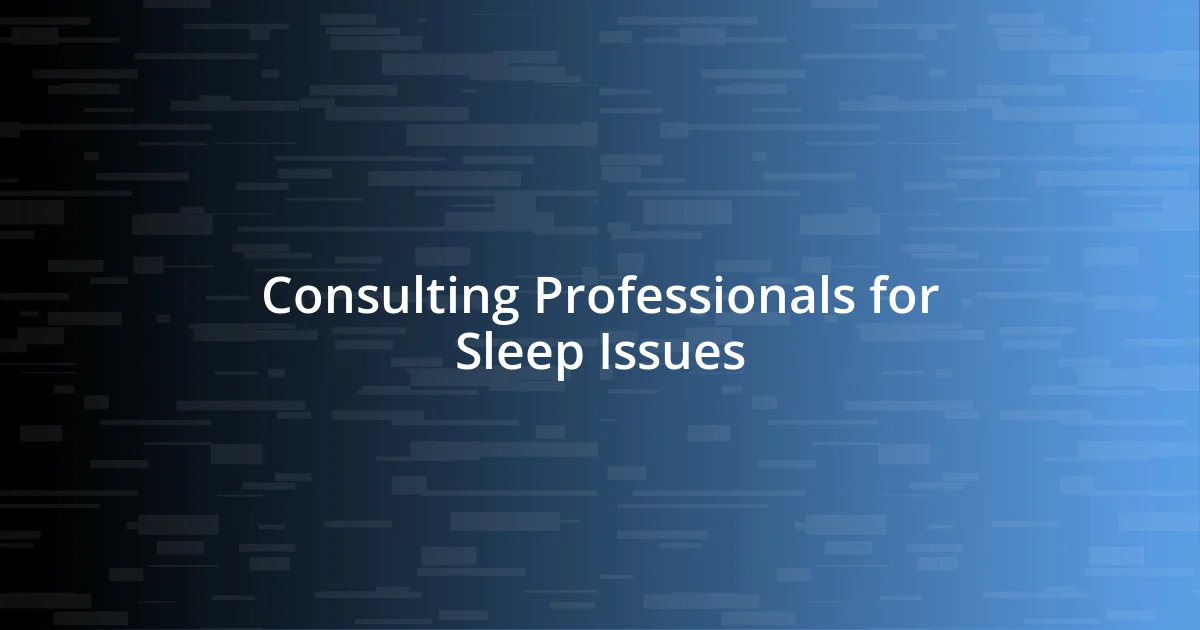
Consulting Professionals for Sleep Issues
Consulting professionals about sleep issues can feel daunting, but I found it to be an illuminating step in my journey. The first time I spoke to a sleep specialist, I was nervous yet hopeful. They not only validated my concerns but also provided a clearer understanding of my sleep patterns. Have you ever had a conversation that changed your perspective? I definitely have, and it was eye-opening.
What struck me during my consultation was the emphasis on a personalized approach to sleep health. The specialist guided me through a detailed sleep study, which revealed insights I never considered—like how my lifestyle choices affected my rest. For example, I learned that my evening screen time was more detrimental than I realized. I had always brushed it off, thinking it was harmless. Have you ever overlooked something that turned out to be significant? I certainly did.
Moreover, the follow-up was just as crucial as the initial meeting. I’ve gained tools from my consultations that I actively incorporate into my nightly routine now. From cognitive-behavioral techniques to reframe my thoughts before bed to tailored advice on sleep hygiene, every piece of knowledge has been a stepping stone. It makes a world of difference when professional guidance personalizes your sleep solution. Have you considered reaching out to a professional to empower your own sleep journey? It’s definitely a step worth taking!












